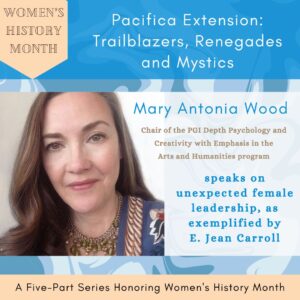 Gather a hundred people in a room and ask them to name a woman who they admire, and you will likely get a hundred different answers. Ask a Pacifica scholar to do the same, and you have Pacifica Extension’s “Trailblazers, Renegades and Mystics” Series, featuring PGI faculty members delving into the lives of extraordinary women who have shaped history. In this thought-provoking, five-part series, Mary Wood, David Odorisio, Camille Harris, Emily Lord-Kambitsch, and Dylan Hoffman offer a depth psychological snapshot of trail-blazing women. These half-hour long talks, available free on Pacifica’s YouTube channel, illuminate the complexities, contributions and relevance of these women’s lives and work for the contemporary challenges we face today.
Gather a hundred people in a room and ask them to name a woman who they admire, and you will likely get a hundred different answers. Ask a Pacifica scholar to do the same, and you have Pacifica Extension’s “Trailblazers, Renegades and Mystics” Series, featuring PGI faculty members delving into the lives of extraordinary women who have shaped history. In this thought-provoking, five-part series, Mary Wood, David Odorisio, Camille Harris, Emily Lord-Kambitsch, and Dylan Hoffman offer a depth psychological snapshot of trail-blazing women. These half-hour long talks, available free on Pacifica’s YouTube channel, illuminate the complexities, contributions and relevance of these women’s lives and work for the contemporary challenges we face today.
E. Jean Carroll
Mary Antonia Wood, Core Faculty at Pacifica and Chair of the Depth Psychology and Creativity with Emphasis in the Arts and Humanities program. Mary shines a spotlight on unexpected female leadership, exemplified by E. Jean Carroll, who bravely faced abuses of power in a legal battle against Donald Trump. Drawing parallels with archetypal figures like the Greek goddess Metis, Mary emphasizes the importance of acknowledging fears and taking action for justice. You can watch the talk here.
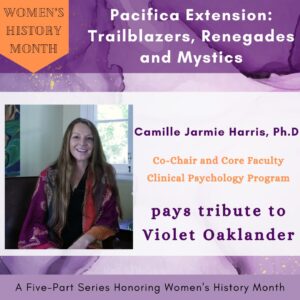 Dr. Violet Oaklander
Dr. Violet Oaklander
Camille Jarmie Harris, Ph.D , Co-Chair and Core Faculty in the Clinical Psychology Program, pays tribute to Dr. Violet Oaklander, who was known for integrating Gestalt therapy and play therapy as a child and adolescent therapist. Dr. Oaklander’s work was particularly impactful because she focused on working with children and adolescents. She also trained other psychologists in the U.S. and abroad, and “created an international community of clinicians, therapists, educators, and parents, all committed to helping young people to understand themselves, advocate for themselves, and how to have systems of support around them.” Dr. Harris speaks about the safe and fun space Dr. Oaklander created for her clients, making therapy fun and accessible. She highlights Dr. Oaklander’s saying, “I don’t fix kids,” meaning children aren’t broken, although the systems they’re part of may be. You can watch the talk here.
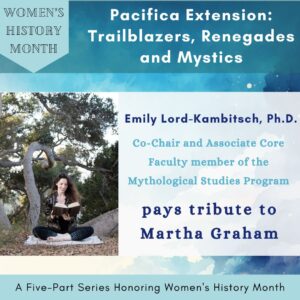 Martha Graham
Martha Graham
Dr. Lord-Kambitsch presents some of Martha Graham’s history and an example of her work, “Night Journey,” which MarthaGraham.com describes as “part of Graham’s Greek cycle and like Cave of the Heart (1946), based upon Medea, and Clytemnestra (1958), inspired by the Orestia, Graham’s interpretation makes the woman’s experience central.” Dr. Lord-Kambitsch also invites you to interpret Martha Graham’s mythic symbols and how they speak to you, as well as offering commentary in Graham’s own words. Dr. Lord-Kambitsch promises that, “more than anything, I’m interested in her sense of how she animates myth and translates it through her body in an immediate kinetic way and also how she interprets her own engagement with myth in her memoir Blood Memory. You can view the video here.
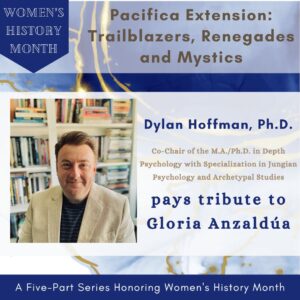
Gloria Anzaldúa
Dylan Hoffman, Ph.D., Co-Chair and Core Faculty of the Jungian Psychology and Archetypal Studies Program, took a different approach, celebrating Gloria Anzaldúa, whom he describes as “Chicana, mestiza, feminist, queer, decolonial, and depth psychological scholar, artist, and spiritual activist. Her writing and life embodied ways that transgressed and transversed many of the dichotomies, divides, and polarities that are at the root of many of the problems in the world today between nations, between genders, between sexualities, between cultures, between spirituality and materiality, between art and activism. In her essays and poetry, Gloria Anzaldúa found a way to name and inhabit what she called the borderland, the Nepantla, or the in-between, which refused dichotomies and getting caught in positions of being either/or, and offered ways of imagining that were both/and, where cultures mix, borders meet, identities are ambiguous, where spirituality and materiality are two sides of the same coin, where art is activism and activism is art. In this way, she offered a means through the impasse we face today in multiple avenues of life.” Listen to more of this amazing talk here.
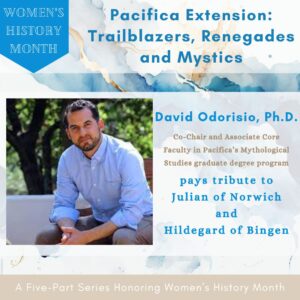 Julian of Norwich and Hildegard of Bingen
Julian of Norwich and Hildegard of Bingen
David Odorisio, Ph.D., Co-Chair and Associate Core Faculty in Pacifica’s Mythological Studies graduate degree program, pays tribute to Julian of Norwich and Hildegard of Bingen, “Two extraordinarily courageous, creative, and very powerful women from the medieval ages. Jung defines mystical experience as experience of the archetypes, a direct experiential encounter with what he would call the core of a certain religion or religious tradition. So for a Medieval Christian mystic, it would be a direct encounter with the archetype of the self, or in the Christian tradition would be considered Christ, but also a direct experience or apprehension in the presence of God.” Dr. Odorisio focuses in particular on how their “direct spiritual, mystic, visionary encounters transformed and evolved our image of God, saying, “The fact that they are both women gives them a certain perspective and transforms these god images in a novel and creative way that male mystics would not be capable of doing.” Watch more on these fascinating women here.
Pacifica Extension offers a rich array of certificates and courses to deepen anyone’s knowledge of depth psychology. Visit their offerings here.

Angela Borda is a writer for Pacifica Graduate Institute, as well as the editor of the Santa Barbara Literary Journal. Her work has been published in Food & Home, Peregrine, Hurricanes & Swan Songs, Delirium Corridor, Still Arts Quarterly, Danse Macabre, and is forthcoming in The Tertiary Lodger and Running Wild Anthology of Stories, Vol. 5.


